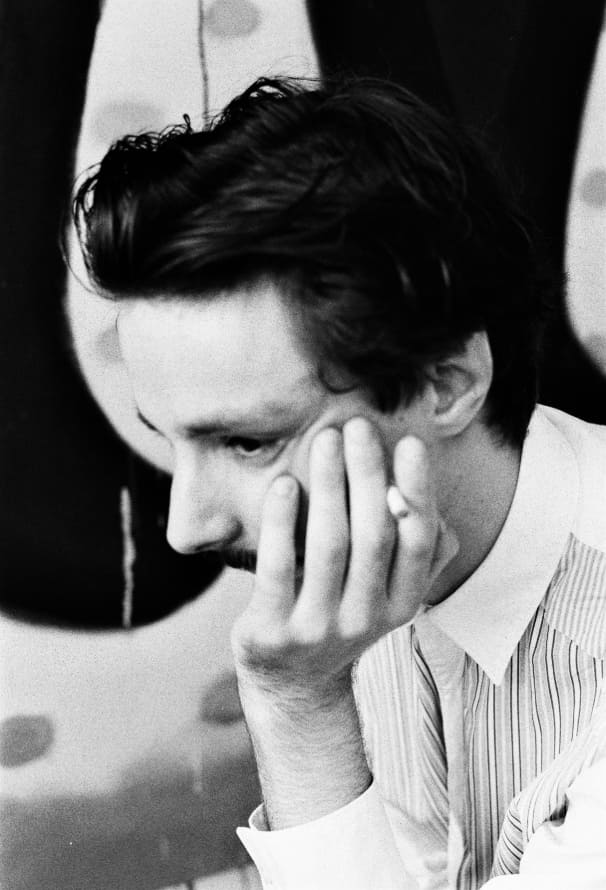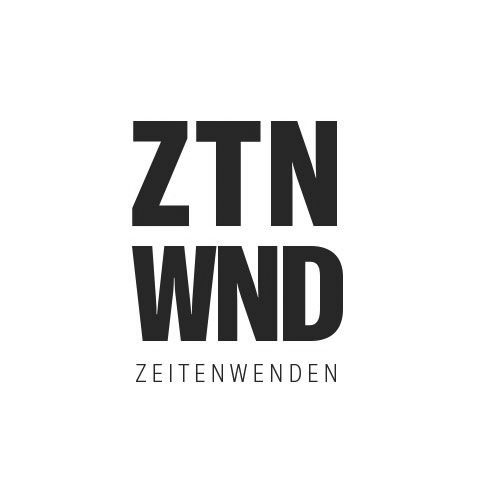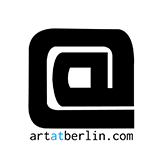PROLOG | PERSÖNLICHES
Max, imagine you would welcome us in your studio or home. Where do we talk together, where do we meet you? We meet in my studio, my favorite place, slightly away from the main building of the HfbK Hamburg on the third floor. It smells of balsamic turpentine oil and cigarettes. On one wall there are many turned-around finished paintings and on another the painting I am currently working on.
Image above: Max Grote, Photo Carlotta Geerds
Please tell us where you were born or grew up and which stages and people have particularly influenced you in your life so far. I was born in Berlin and after six months I moved from Charlottenburg to Potsdam, a bit away from the city center, where I also went to school. The only two people who had anything to do with art or were interested in it were my godparents. I still vaguely remember going to my first vernissage at the age of about six by an artist they were friends with – Adam Saks.

After leaving school, I moved to Berlin-Weissensee to study fashion design at the art school there for two years. After the artistically free foundation year there, I realized that I was more fascinated by painting, which I also claim to have fallen in love with. So after the year I rented a small studio in the Potsdam Rechenzentrum, where I also met my now gallerist Sandra Schindler, who exhibited me solo in her LAB after six months.
Another important stop for me was the group exhibition “Gegen den Srich” at Sacrow Castle in August 2024.
I then moved to Hamburg in October 2024 to start my painting studies here.
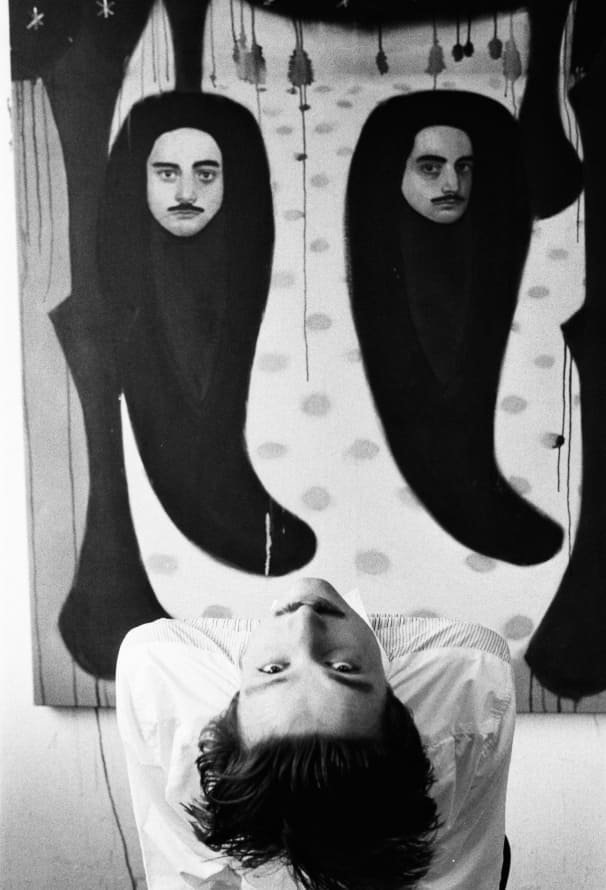
Which writers do you find exciting at the moment and which books can be found on your bookshelf? In my small library you will mainly find illustrated books from various positions, which I often and happily leaf through in search of ideas and inspiration.
Which books have influenced or shaped you? I was particularly influenced by the discovery of a book by Miriam Cahn. But it’s mostly artist documentaries, interviews or panel discussions or Brainrot that influence me.
What music do you listen to and when? I listen to a lot of hyperpop and new wave – always, actually. When I’m painting, in the shower or anywhere else.

If you were to cook something for us, what would it be? I would cook what I do best – pesto pasta with tomatoes and onions.
What is your favourite food? If I had the money for it, I would eat a lot more sushi.
What do you think about breakfast? I always have breakfast in my studio around 13/14:00. Usually muesli with milk, an apple and coffee.
What kind of sport or compensation do you do for your artistic work? I don’t think I have anything like that, I’m always in the studio from morning till night and when I’m not there I visit museums or galleries or think about art.

Do you have any special passions (hobbies) that you are passionate about, and if so, which ones? Nowadays it has diminished considerably, but I have played a lot of chess since my early childhood. Unfortunately, it has just become a bit rare.
What personality trait particularly defines you? I think that’s my willpower and motivation.
INTERVIEW | ARTIST + POSITION
How did you get into art? Why art?
First of all, I got into fashion – the work of Rei Kawakubo at Comme des Garcons was the deciding factor. After my successful application, I walked through the Neue Nationalgalerie for the first time voluntarily and with real perception and realized that there are other media you can work with. So I bought some canvas and paint and just started painting and really enjoyed it.
What is currently making you happy?
It makes me very happy when I can work undisturbed in the studio all day.
What is currently scaring you?
I don’t think it really scares me because the thought is too abstract, but being drafted and having to go to war. The completely absurd thing about the thought is that I would be fighting against people of my generation. People who consumed the same memes, the same brainrot. People who played Fortnite.
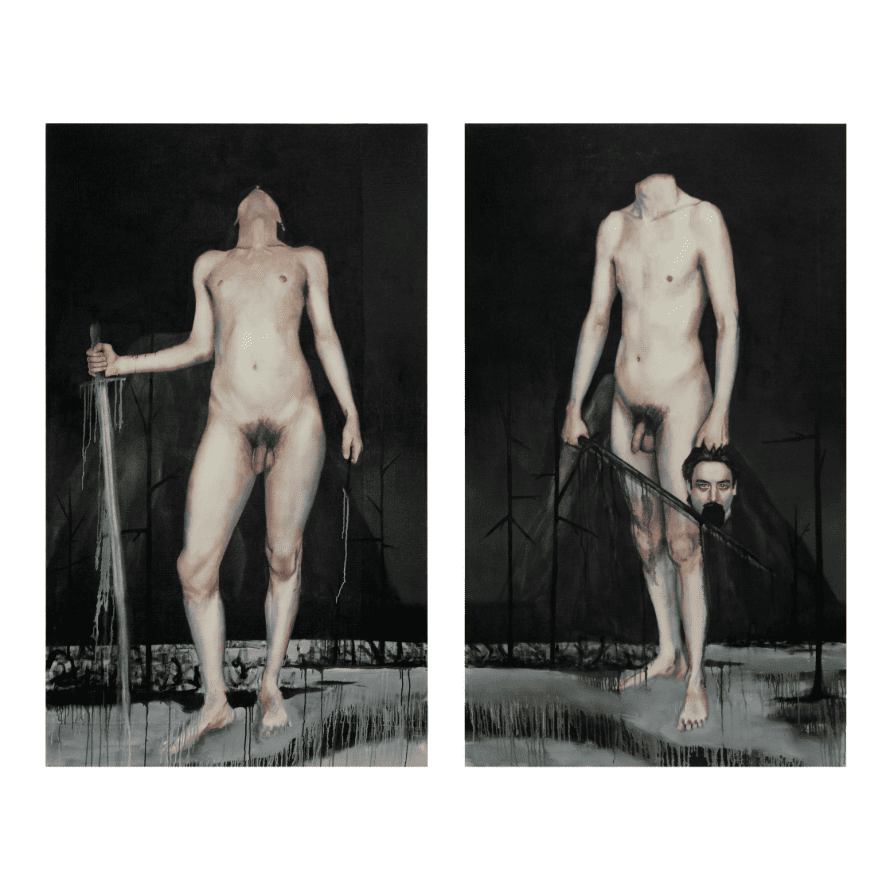
Glaubst Du, dass Kunst eine gesellschaftliche Verantwortung trägt? Und was denkst Du, was sie bewirken kann?
I think that art only has to serve itself. I also don’t think it has a great influence, as it is a very specific and small group of people who deal with it.
What characterises your art? What is your work about – what are the central themes?
I mainly paint self-portraits, which at first glance have a certain seriousness, but always have something ironic about them. At the moment it’s a lot about my own body image, vulnerability, recurring suicidal thoughts, the resulting dying and being born, my own position in the art world, the dialog with art history, love dramas and always a reflection of medieval fashion.
Read more about Max Grote’s artistic message in THE DEED | DAS WERK:
THE DEED | DAS WERK
The artist Max Grote, who was born in Berlin in 2003 and has lived in Hamburg since 2024, talks about the central message of his artistic work.
Please describe the core theme and central message of your work.
–
Introduce to us the work that you feel exemplifies or best embodies the message of your work.
I don’t think that’s possible. You always have to look at a series of works. A painting is always just a painting with very, very brief content and the content varies from work to work.
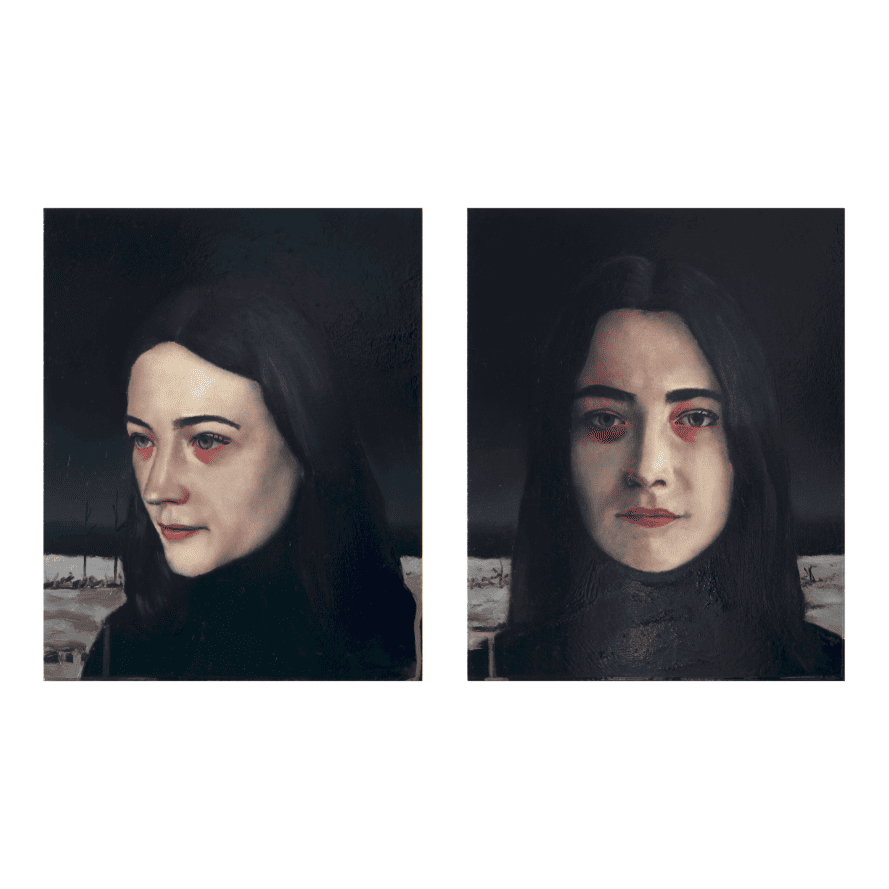
What is the goal of your art, of your work – what is it supposed to do for the viewer?
My goal is always to come to terms with myself so that I am satisfied with the work. To find a solution with myself. I don’t really care what it triggers in the viewer.
Die Frage nach THE DEED | DAS WERK ist ein ergänzender und separat präsentierter Teil des THE INTERVIEW IN|DEEDS mit Max Grote. Der Umfang der Antworten obliegt den Interviewten. Die Redaktion redigiert die Antworten nicht.
How do you protect yourself from too much inspiration in today’s times?
My head is always relatively clear. I’m very good at focusing and blocking out what’s not important.

How much of your work is planned in advance – how much arises intuitively?
My paintings are always planned in my head. Everything has a reference. Only the realization of some references is intuitive – landscapes, for example.
What are your (next) goals?
My longer-term goal is definitely to finish my studies. In the short term, I want to paint a 300x380cm picture.
What is your position on the subject of faith? Do you have principles of faith or is there a motto?
I was baptized, confirmed and went to a Catholic grammar school for two years, but I don’t believe.
My motto is “Shit doesn’t paint itself.”.
Which project would you still like to realise if a lack of time, courage or financial resources did not play a role?
One day I would like to build a huge castle.

In your view, what are the attributes of good art?
I think that a good work always shows itself through a good technique and the influence of references. Even with non-objective art, I think you can see whether the artist has a good technique/ could paint academically.
Is one born as an artist? Or is studying art compulsory?
I think you are born an artist, but this is not so much characterized by a kind of practice that has always been there, but by certain character traits – for example, a big problem with authority and a very strong self-will. I always hated art lessons at school, I always got a 5 and dropped art early on.
Of course, studying art is not compulsory, but it opens many doors.
How do you see the future of art in the age of AI?
I’ll quote one of the Studio Ghibli founders, Hayao Miyazaki, at this point, because I couldn’t say it better: “Whoever creates this stuff has no idea what pain is whatsoever. I am utterly disgusted… I strongly feel that this is an insult to life itself.”
What is your opinion on the topic of NFT?
I see NFTs more as speculative assets that are now obsolete.

Who do you show a new work to first?
Mostly my friends from the neighboring studios.
What does the first hour of your day look like?
It’s quite terrifying, but the first hour always consists of me, my cell phone and brainrot on Reels.
In the age of the Internet of Things, are galleries still necessary? If so, why and for what?
Galleries will always be necessary as a space in which to experience art. A photograph does not achieve the same thing. A gallery always brings a network with it. I am very grateful to Sandra for what she does.
EPILOG | CURRENT
Max Grote is currently represented by the Schindler Gallery in Potsdam. He recently attracted a lot of attention as part of the exhibition ‘Against the Grain – Generation Z in Art’, which was shown at Sacrow Castle near Potsdam in late summer 2024 and was also reported on by the Tagesschau news programme.
Instagram: @maxgrote_
DEEDS interviews are not edited or abridged by our editorial team and are always reproduced in the original sound. Therefore, we do not translate the interview into English or German unless the interviewee submits a translation or we are commissioned to do so. In this case, the German and English versions of the interview were submitted by the artist himself.


